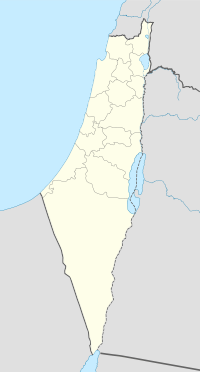Khirbat al-Buwayra
Khirbat al-Buwayra
خربة البويرة | |
|---|---|
Village | |
| Etymology: the little pit[1] | |
A series of historical maps of the area around Khirbat al-Buwayra (click the buttons) | |
Location within Mandatory Palestine | |
| Coordinates: 31°52′27″N 35°00′52″E / 31.87417°N 35.01444°E | |
| Palestine grid | 151/142 |
| Geopolitical entity | Mandatory Palestine |
| Subdistrict | Ramle |
| Date of depopulation | July 15, 1948 |
| Population (1945) | |
• Total | 190[2][3] |
Khirbat al-Buwayra was a Palestinian Arab village in the Ramle Subdistrict. It was depopulated during the 1948 Arab-Israeli War on July 15, 1948, under the second phase of Operation Dani. It was located 15 km southeast of Ramla.
History
[edit]By the beginning of the 20th century, residents from Qatanna settled Khirbat al-Buwayra, establishing it as a dependency – or satellite village – of their home village.[4]
In the 1931 census El Buweiyiri had 101 Muslim inhabitants, in a total of 17 houses.[5]
In the 1945 statistics, it had a population of 190 Muslims[2] and 1,150 dunums of land.[3] Of this, 31 dunums were irrigated or used for orchards, 316 dunums were used for cereals,[6] while 803 dunams were classified as non-cultivable areas.[7]
The center of the village contained many wells and the village has a khirba with the foundation of a building with cisterns. Today the village area is used as a military training ground by the Israeli Army.[8]
-
Khirbat al-Buwayra from 1919 survey 1:20,000.
-
Khirbat al-Buwayra 1945 1:250,000 (bottom left quadrant)
References
[edit]- ^ Palmer, 1881, p. 292
- ^ a b Government of Palestine, Department of Statistics, 1945, p. 29
- ^ a b Government of Palestine, Department of Statistics. Village Statistics, April, 1945. Quoted in Hadawi, 1970, p. 67
- ^ Marom, Roy (2022). "Lydda Sub-District: Lydda and its countryside during the Ottoman period". Diospolis – City of God: Journal of the History, Archaeology and Heritage of Lod. 8: 124.
- ^ Mills, 1932, p. 19
- ^ Government of Palestine, Department of Statistics. Village Statistics, April, 1945. Quoted in Hadawi, 1970, p. 115
- ^ Government of Palestine, Department of Statistics. Village Statistics, April, 1945. Quoted in Hadawi, 1970, p. 165
- ^ Khalidi, 1992, p. 372
Bibliography
[edit]- Government of Palestine, Department of Statistics (1945). Village Statistics, April, 1945.
- Hadawi, S. (1970). Village Statistics of 1945: A Classification of Land and Area ownership in Palestine. Palestine Liberation Organization Research Center.
- Khalidi, W. (1992). All That Remains: The Palestinian Villages Occupied and Depopulated by Israel in 1948. Washington D.C.: Institute for Palestine Studies. ISBN 0-88728-224-5.
- Mills, E., ed. (1932). Census of Palestine 1931. Population of Villages, Towns and Administrative Areas. Jerusalem: Government of Palestine.
- Morris, B. (2004). The Birth of the Palestinian Refugee Problem Revisited. Cambridge University Press. ISBN 978-0-521-00967-6.
External links
[edit]- Welcome To al-Buwayra, Khirbat
- Khirbat Buwayra, Zochrot
- Survey of Western Palestine, Map 17: IAA, Wikimedia commons








